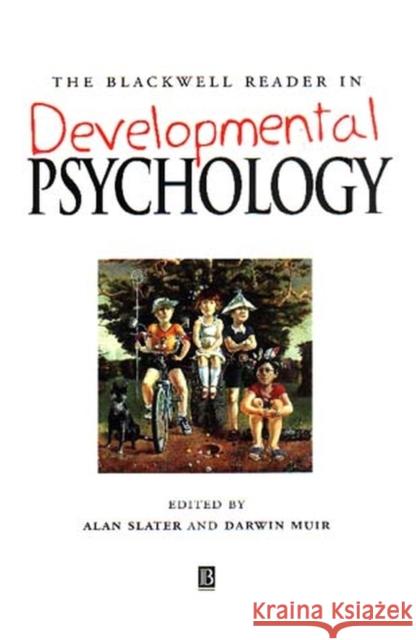Development Psychology » książka



Development Psychology
ISBN-13: 9780631207191 / Angielski / Miękka / 1999 / 584 str.
Development Psychology
ISBN-13: 9780631207191 / Angielski / Miękka / 1999 / 584 str.
(netto: 220,26 VAT: 5%)
Najniższa cena z 30 dni: 228,91
ok. 30 dni roboczych.
Darmowa dostawa!
Developmental psychology is one of the most exciting and dynamic areas of scientific enquiry to be found.
- Provides the key readings in developmental psychology in one volume.
- Introduces and contextualises each reading for ease of use and reference.
- Presents an excellent reference and study tool for students and academics alike.
- Includes postscripts to classic papers i. e. newly commissioned articles by the papers' original author updating their research.
"This is the book of readings in psychology that instructors have been looking for. Slater and Muir have assembled a set of influential and interesting articles. It is a beautifully organized reader that will be a terrific resource for all courses in developmental psychology."
Professor Andrew Meltzoff, University of Washington
"...gives students insights beyond what is normally presented in developmental texts...In a task that is daunting just for the sheer number of articles published, they have chosen an array that both captures the diversity of research done in the field and conveys the excitement of those who conduct this research." APA Review of Books, October 2000
List of Figures.
List of Tables.
List of Plates.
Preface.
Acknowledgements.
Part I: History and Developmental Theory:.
1. Introduction to Developmental Functions: Darwin Muir.
2. A Biographical Sketch of an Infant: Charles Darwin.
3. Baby in a Box: B. F. Skinner.
4. The Stages of the Intellectual Development of a Child: J. Piaget.
5. The Connectionist Infant: Would Piaget Turn in His Grave?: Annette Karmiloff–Smith.
Part II: Continuity–Discontinuity and Nature–Nurture Issues:.
6. Can Measures of Infant Information Processing Predict Later Intellectual Ability?: Alan Slater.
7. Biological Bases of Childhood Shyness: J. Kagan, S. Reznick and N. Snidman.
8. The Genetic Basis of Complex Human Behaviors: R. Plomin, M. Owen and P. McGuffin.
Part III: Perception and Cognition:.
9. Of Human Bonding: Newborns Prefer their Mothers′ Voices: T. DeCasper and W. Fifer.
10. Listening to Speech in the First Year of Life: J. Werker and R. Desjardins.
11. Pattern and Space Perception in Young Infants: D. Muir, D. Humphrey and G. Humphrey.
12. Imitation of Facial and Manual Gestures by Human Neonates: A. Meltzoff and M. Moore.
13. Resolving the Debate about Early Imitation: A. Meltzoff and M. Moore.
Part IV: Memory, Learning and Cognition:.
14. Reactivation of Infant Memory: C. K. Rovee–Collier, M. W, Sullivan, Mary Enright, D. Lucas and J. W. Fagan.
15. Rapid Change in the Symbolic Functioning of Very young Children: J. S. DeLoache.
16. Deception in 3–year–olds: M. Lewis, C. Stanger and M. W. Sullivan.
17. How Suggestible are Preschool Children? Cognitive and Social Factors: Stephen J. Ceci and Mary Lyn Crotteau Huffman.
18. Development of Children′s Knowledge about the Appearance–Reality Distinction: J. Flavell.
19. Children as Folk Psychologists: The Developing Understanding of the Mind: K. Lee and B. Homer.
20. Development of Intuitive Theories of Motion: Curvilinear Motion in the Absence of External Forces: M. K. Kaiser, M. McCloskey and D. R. Proffitt.
Part V: Language and Communication:.
21. Babbling in the Manual Mode: Evidence for the Ontogeny of Language: L. Pettito and P. F. Marentette.
22. The Role of Discourse Novelty in Early Word Learning: N. Akhtar, M. Carpenter and M. Tomasello.
23. Young Children′s Appreciation of the Mental Impact of Their Communicative Signals: H. Shwe and E. Markman.
24. Rules of Language: S. Pinker.
25. Children′s Understanding of Notions as Domains of Knowledge versus Referential–Communicative Tools: L. Tolchinsky–Landsman and A. Karmiloff–Smith.
26. Categorizing Sounds and Learning to Read – A Causal Connection: L. Bradley and P. E. Bryant.
Part VI: Social and Emotional Development:.
27. Self Development and Self–Conscious Emotions: M. Lewis, M. Sullivan, C. Stanger and M. Weiss.
28. Recent Developments in Attachment Theory and Research: S. Goldberg.
29. American Child Care Today: S. Scarr.
30. Chinese and Canadian Children′s Evaluations of Lying and Truth Telling: Similarities and Differences in the Context of Pro– and Anti–social Behaviors.
31. The Relationship Between Parenting Types and Older Adolescents′ Personality, Academic Achievement, Adjustment and Substance Use: L. H. Weiss and J. C. Schwartz.
32. Understanding Bullying from a Dynamic Systems Perspective: D. Pepler, W. M. Craig and P. O′Connell.
33. The Company they Keep: Friendships and their Developmental Significance: W. Hartup.
Part VII: Children at Risk:.
34. Helen Keller: An Extraordinary Life: Alan Slater.
35. Children of the Garden Island: E. Werner.
36. Learning and Development in Children With Down′s Syndrome: J. Wishart.
37. Cognitive Development and Cognitive Deficit: U. Frith.
38. Head Start: Criticisms in a Constructive Context: E. Zigler and S. Styfco.
39. The Domain of Developmental Psychopathology: L. Sroufe and M. Rutter.
Index.
Alan Slater is Senior Lecturer in Psychology at the University of Exeter.
Darwin Muir is Professor of Psychology at Queen′s University in Kingston, Ontario.
Developmental psychology is one of the most exciting and dynamic areas of scientific enquiry to be found. This collection of readings provides the reader with an introduction to the area by giving immediate access to a broad ranging selection of papers written by one or more leading international experts.
The Blackwell Reader in Developmental Psychology contains articles that have been selected to reflect the wide variety of topics investigated by developmental scientists, the dynamic changing nature of the subject, and the current state of the art. All of the articles, many of which have been specially commissioned for this book, are accessible to students at all levels of their studies in developmental psychology. The Reader can thus be used either in conjunction with, or as a replacement for, a textbook that offers an introduction to this dynamic area of study.
1997-2026 DolnySlask.com Agencja Internetowa
KrainaKsiazek.PL - Księgarnia Internetowa









